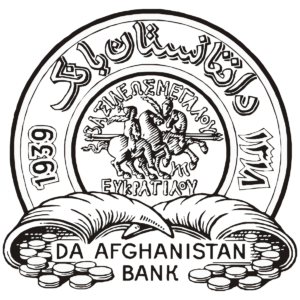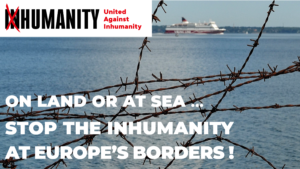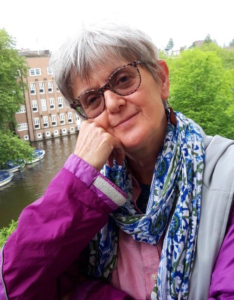 |
An interview with Avril Loveless, Gatwick Detainees Welfare Group (GDWG) UAI: Avril, could you tell us what you do at GDWG? |
UAI: Could you say something about the detention facilities at Gatwick and the conditions for detainees?
AL: At the end of the runway at Gatwick are two ‘Houses’ – Brook House and Tinsley House. They are effectively prisons, somewhat euphemistically called Immigration Removal Centres. The key feature of immigration detention in the UK is that it is indefinite detention – when the door bangs shut behind them, people do not know whether they will be detained in these conditions for days, weeks, months or years. We can only begin to imagine what that does to the physical and mental wellbeing of those who are detained, and their families.
There is a wide range of reasons why people are detained, but asylum seekers are often detained as a risk to public security or the authorities consider they might abscond before their asylum case has been
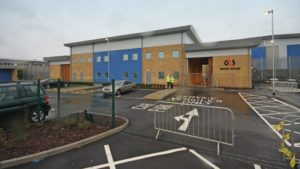
resolved. They might have arrived in the UK by flying in to Heathrow, in the darkness of a back of a lorry or in a small boat in the Channel. People seeking asylum, seeking refuge, are what Agamben calls ‘the bare human’. They have left their homes and places of safety for a wide range of reasons and have lost so much, yet arrive with their essential humanity shining through.
UAI: In what ways do you consider detention centres to be inhumane?
AL: Detention centres are inhumane in several ways:
- The architecture of the centres is designed to brutalise all those contained within the walls, corridors of locked doors, cells with no exterior windows and barbed wire fences. Brook House was designed as a Category B prison. ‘Why am I here? ‘What crime or sin have I committed???’ ‘My grandmother told me that hell has 7 levels. As all the doors locked behind me and the guards shook their keys I thought that I was going down into hell’
- The rooms are shared between 2 or 3 people. There is a thin mattress on a hard bed. There is a toilet between the beds, often with no curtain. There is no privacy. There are no quiet places and the noise of shouting from other cells can be incessant
- Healthcare is often inadequate when people are without their medication, or given paracetamol for a range of conditions, from severe pain to depression
- If a person needs an external visit to hospital or the dentist they can be shackled, which can lead to PTSD (post traumatic stress disorder) for many people seeking refuge from violent persecution. One person I visited had his wrists crushed when he resisted being shackled
- Activities are limited. There are some language classes, art classes and sometimes music workshops. Nothing is sustainable because detention is indefinite
- Some take part in work in the detention centre to relieve both the monotony and the sleepless nights. They can work as cleaners, or in the laundry, or in the canteen. They are paid £3 a day. Work is a privilege which can be taken away
- In a BBC Panorama programme of 2017, undercover filming exposed physical brutality of the officers against the people detained and the use of solitary confinement. There will be a public enquiry into the treatment of people in Brook House during the period covered by the programme
UAI: Can you tell us something about the process which detainees have to go through in order to be released or prevent their deportation?
AL: The inhumanity of the bureaucracy works through ‘Slow violence and murderous absences’:
- There is cruelty in the lack of information and clarity, the interminable waiting times, the cancelled bail hearings, the Home Office appeals against judges’ decisions which favour the detainees, the reduction of people to numbers. One person described it as ‘it is like being suspended in the air’. We have a friend who was granted refugee status after 9 years. We have another friend who is still waiting for a decision after 11 years
- There is cruelty in the intimidating style of interviews and interrogation, from questions intended to trick to questions of sexual history if you’re gay
- There is cruelty in what is NOT done to people: they are not believed, they are ignored, they suffer from lack of information
- Families are separated and children’s births are missed
UAI: How would you like to see this situation change?
AL: There are alternatives to immigration detention within the community and we call for an end to indefinite detention, with a time limit of 28 days in alignment with the criminal justice system.
UAI: What do you feel you can do to help?
AL: We can take small steps to befriend within the detention centres and bear witness in the wider world. GDWG has been active for 25 years. With 6 members of staff and 70 volunteers we have a system of visiting people in detention once a week for as long as it takes. We recognise the human beings sitting across the table in the bleak visitors’ room and take an interest in their ‘bigger lives’. We can’t DO much, but we can offer some support with clothes and phone credit, as well as keep an eye out for any medical or legal needs for which we can make referrals.
UAI: Can you tell us something about the Refugee Tales project?
AL: Refugee Tales is a project through which we seek to raise awareness of this situation, call for an END to indefinite detention and campaign for a 28 day time limit. The project, unashamedly based on the Canterbury Tales (written between 1387 and 1400), has a number of interweaving threads:
- We – visitors, former detainees and supporters – walk together
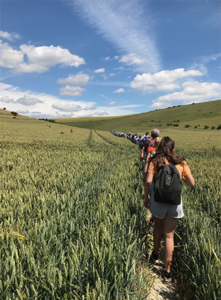 companionably and share our lives over 5 days, a core of around 90, with day walkers joining us for parts of the route. Sometimes up to 150 people. We’ve walked 5 times. This is our 6th year.
companionably and share our lives over 5 days, a core of around 90, with day walkers joining us for parts of the route. Sometimes up to 150 people. We’ve walked 5 times. This is our 6th year. - As we walk we claim the landscape. We are a spectacle of welcome across England’s green and pleasant land
- Each night we hear the performance of Tales read by established authors who have met people with experience of indefinite detention, heard their story and used their talents and skills to present the tale to audiences. Last year and this year we have included tales told directly by the people with lived experience – the detainee’s tale; the soldier’s tale; the lover’s tale; the unaccompanied minor’s tale; the barrister’s tale; the counsellor’s tale; the lorry driver’s tale.
Tales have also been told to writers such as Ali Smith, Chris Cleave, Kamila Shamsie, Dragan Tagorovic, Inua Ellams, Olivia Laing, Marina Warner, Jackie Kay, Will Self, and Neel Mukherjee. - There are three threads that run through this endeavour that we have to constantly think about and act upon in order to present this project with integrity:
- the ethics of telling other people’s stories when there is danger of misrepresentation, appropriation, and celebrity gilding for a middle class literary festival of misery porn
- the recognition of how the invited writers address this in order to honour the stories they are told, to give a deeper sounding and a luminosity in order to ‘ring true’
- the desires and responses of the detainees themselves:
- tell the stories that are whispered in the bleakness of the visitors’ rooms in Brook and Tinsley so that they are not abandoned and forgotten
- we trust you to use your language and your connections and your cultural capital to make our stories known in the call for an end to indefinite detention
- we realized that through these difficult times of waiting as we sustain our relationships with detainees and writers over months and years we have the potential for longstanding friendship
UAI: Can you bring us up to date since the arrival of COVID-19?
AL: Visiting has stopped now, and we are supporting those still in detention by phone. It isn’t easy at all. GDWG staff are maintaining contact with Brook House and Tinsley House management and Welfare department. They are also offering support for the visitors and setting up online groups for us to stay in touch with each other. GDWG has written to the Home Office asking for all detainees to be released. And, in fact, over 300 detainees were released shortly before the lock-down that began on 23 March 2020. We believe that this demonstrates that administrative detention of asylum-seekers is unnecessary and could be stopped.
UAI: Thank you so much, Avril. Do you have any final thoughts?
AL: We consider indefinite detention to be expensive, ineffective (nearly half of those detained are eventually released into the community to await decisions), and a waste of human life.
Interview conducted early April 2020
Photo credits: ©Terry Freeman ©GDWG
